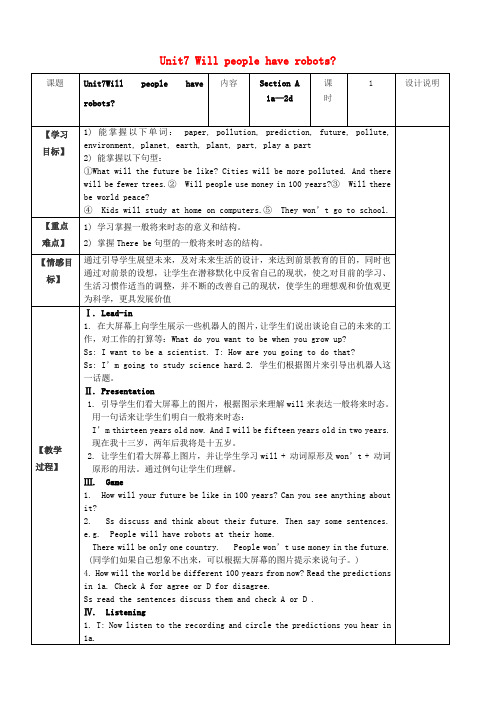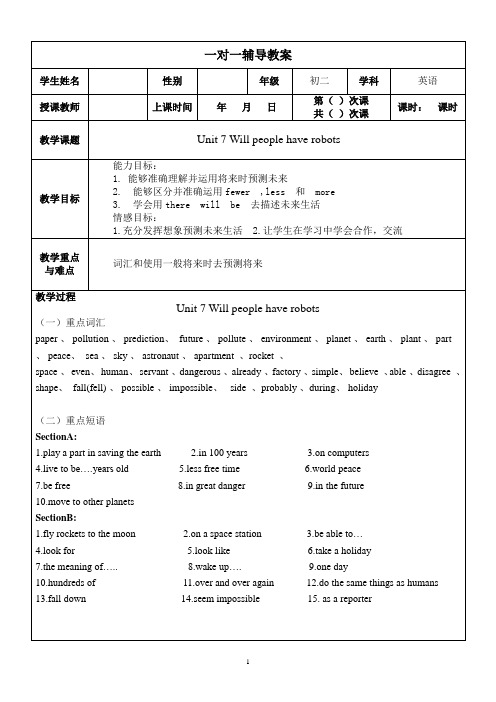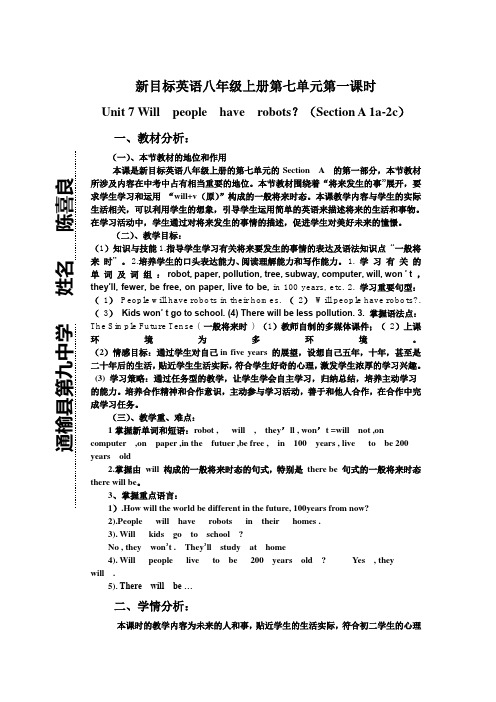八年级英语上册 Unit 7 Will people have robots Period 2教案 (新版)人教新目标版
Unit7 Will people have robots精品教案

(2)There will be more/less/fewer…
能力目标:.Make sure that Ss can use“SB will do sth andthere will be”to describe the future world and the future city.
2.Ss show their predictions to their partners.
3.Ss show their predictions to the class.
2.Ask Ss work in group of four to write down more predictions about the world in 100 years, according to the pictures and the sentence structure. (学生也可作提示之外的预测。)
3.Ss share ideas together. Do they agree or disagree?
4.Lead Ss to look at the picture and the two boys’predictions in1a.
5.Listen to the two boys’conversation, circle the predictions you hear and check the answers.
1.According to the mind map in this part, give my predictions as examples.“I think there will be…引出more, less和fewer.
2.Lead Ss tolook at the picture and the sentences in2a. Then listen to2aand circle the word heard.Check the answers.
八年级英语上册 Unit 7 Will people have robots教案

e.g. People will have robots at their home.
There will be only one country. People won’t use money in the future.
3. There be句型的一般将来时结构:
肯定式:There + ________ +其他否定式:There + ___________ +其他
一般疑问句:__________ + be +其他?答语:Yes, there will. / No, there won’t.
三、 可数名词1. more + 2. less +不可数名词
然后,根据空格后的名词是可数名词还是不可数名词来确定是用more, less还是fewer。注意,有些名词前有形容词来修饰。
(同学们如果自己想象不出来,可以根据大屏幕的图片提示来说句子。)
4. How will the world be different 100 years from now? Read the predictions in1a. Check A for agree or D for disagree.
(5) less water(6) playa part
【教学
反思】
课题
Unit7Will people have robots?
内容
Section A Grammar—3c
课时
2
设计说明
【学习目标】
1)学习掌握下列词汇:peace, sea, sky
Will people have robots 教案(9课时)人教版八年级英语上册

【Unit Target】单元目标Unit 7 Will people have robots?【Topic】话题Life in the future 未来的生活【Functions】语言功能:Make predictions 能谈论对未来的预测A: What will the future be like?B: Cities will be more polluted. And there will be fewer trees.A: Will there be world peace? B: Yes, I hope so.【Structures】语言体系:Future tense with will;Quantities with more, less, fewer【Target language】重点句型:A: Will people use money in 100 years?B: No, they won’t. Kids will study at home on computers. They won’t go to school.There will be more pollution/people. There will be less free time.There will be fewer cars and more buses.【Vocabulary】重点词汇及短语:词汇:paper, pollution, prediction, future, pollute, environment, planet, earth, plant, part, peace, sea, build, sky apartment, space, human, dangerous, already, factory, Japan, believe, disagree, even, agree, shape, fall, inside, possible, impossible, side,短语:space station;help with ;over and over again;in the future;get boredwake up;disagree with sb.;hundreds of;fall down;look for【Unit Periods】单元课时:Nine periods 9课时Unit 7 Will people have robots?(第一课时)教案授课时间_____________【教学目标】(核心素养目标)1. To teach the key vocabulary on P49-50.2. Make predictions with “will”.3. Simple Future Tense with “will”.4. Reflect the language ability of core competency.【教学重点】1. Make predictions with “will”. 2. Simple Future Tense with “will”.【教学难点】Use Simple Future Tense with “will”correctly.【教学过程】一、清(温故知新):Oral report: 结合上节课所学词汇,句型或话题做一个2分钟的口语汇报。
人教新目标八年级上册英语《Unit 7 Will people have robots?》Secti

人教新目标八年级上册英语《Unit 7 Will people have robots?》Section B_教学设计2一. 教材分析《Unit 7 Will people have robots?》Section B 包含了一个阅读理解和两个活动。
本节课主要通过阅读一篇关于未来机器人的文章,让学生掌握一般将来时的用法,并能够运用本课所学知识进行简单的未来预测。
文章内容丰富,插图生动,能够激发学生的学习兴趣。
二. 学情分析八年级的学生已经掌握了英语学习的基本语法和词汇,对于一般将来时也有了一定的了解。
但部分学生在阅读理解方面仍有困难,需要教师的引导和帮助。
此外,学生们的口语表达和写作能力也需要进一步提高。
三. 教学目标1.能够理解文章的主旨大意,掌握一般将来时的用法。
2.能够运用本课所学知识进行简单的未来预测。
3.提高学生的阅读理解能力和口语表达能力。
四. 教学重难点1.一般将来时的用法。
2.提高阅读理解能力,理解文章的主旨大意。
五. 教学方法采用任务型教学法,让学生在完成任务的过程中,自然而然地学习和掌握知识。
同时,运用启发式教学法,引导学生主动思考,提高他们的阅读理解和口语表达能力。
六. 教学准备1.打印文章,准备教材。
2.准备与文章内容相关的图片或视频,以便在课堂上进行展示。
3.准备一些问题,用于引导学生进行思考和讨论。
七. 教学过程1.导入(5分钟)利用图片或视频展示未来机器人的场景,引导学生思考:Do you like robots? Why? 让学生自由发言,表达自己的观点。
2.呈现(10分钟)给学生分发文章,让他们独立阅读。
在阅读过程中,教师可适时提出一些问题,帮助学生理解文章内容。
例如:What will happen in the future?How do people feel about robots?3.操练(10分钟)学生分组,根据文章内容,进行角色扮演。
要求学生运用一般将来时进行对话,模拟未来的场景。
人教版八年级上册英语第七单元Unit7教案

用将来时.I can finish the work in two days.我两天之内能完成这项工作。
She will graduate in two years.她两年后毕业。
2)after指以过去时间为起点的“在一段时间以后”,所以与过去时态连用。
当after指某个特定的未来时刻或日期之后,或指一将来某一时间为起点的若干时间之后时,他可以与将来时态连用。
Eg.He started on Sunday and arrived in Beijing after three days.他周日启程三天后抵达的北京。
I’ll be back after three o’clock.他三点之后回来。
4.There will be fewer people.会有较少的人There will be less free time. 较少的空闲时间There will be more pollution.更多的污染fewer 是few 比较级,其后接名词复数。
“较少的,少量的”与less 是同义。
I have fewer friends in my class.在我们班我有较少的朋友。
less 是little 的比较级,其后接不可数名词。
“较少的,少量的”more 是many 和much 的比较级即可跟不可数名词也可跟复数名词。
“更多”He has more money and more friends 他有更多的钱和更多的朋友。
There will be less pollution in the future.将来会有较少的污染。
5.(be)in great danger.处于极度危险中。
They are in great danger .他们处于极度危险中We should save animals in danger. 我们应该拯救处于危险中的动物。
6.There are already robots working in factories. There be+n. +v.ing .某地有某人正在做某事There are many girls singing in the room . 有许多女孩正在房间里唱歌。
英语人教版八年级上册Unit-7Will-people-have-robots

Unit 7 Will people have robots?(Section A 1a-2c)一、教材分析:(一)、本节教材的地位和作用本课是新目标英语八年级上册的第七单元的Section A 的第一部分,本节教材所涉及内容在中考中占有相当重要的地位。
本节教材围绕着“将来发生的事”展开,要求学生学习和运用“will+v(原)”构成的一般将来时态。
本课教学内容与学生的实际生活相关,可以利用学生的想象,引导学生运用简单的英语来描述将来的生活和事物。
在学习活动中,学生通过对将来发生的事情的描述,促进学生对美好未来的憧憬。
(二)、教学目标:(1)知识与技能1.指导学生学习有关将来要发生的事情的表达及语法知识点“一般将来时” 。
2.培养学生的口头表达能力、阅读理解能力和写作能力。
1. 学习有关的单词及词组:robot, paper, pollution, tree, subway, computer, will, won ’ t ,they’ll, fewer, be free, on paper, live to be, in 100 years, etc. 2. 学习重要句型:(1)People will have robots in their homes. (2)Will people have robots?. (3)Kids won’ t go to school. (4) There will be less pollution. 3. 掌握语法点:The Simple Future Tense ( 一般将来时) (1)教师自制的多媒体课件;(2)上课环境为多环境。
(2)情感目标:通过学生对自己in five years 的展望,设想自己五年,十年,甚至是二十年后的生活,贴近学生生活实际,符合学生好奇的心理,激发学生浓厚的学习兴趣。
(3) 学习策略:通过任务型的教学,让学生学会自主学习,归纳总结,培养主动学习的能力。
人教版八年级上册英语教案Unit 7 Section B 2a-2e带教学反思
a.They helpwith the housework and do jobs like working in dirty or dangerous places.
b.Fewer people will do such jobs in thefuture because they are boring, but robots will never get bored.
3. Work on 2d.
CallSs' attention to 2d. Look at the picture and scan the passage for the main idea.Fill in the blanks in this paragraph with words from the article in 2b. Choose 2 or 3 Ss to give the answers. Check the answers together.
Step 7
Homework
(PPT 49)
1. Go over the article on Page 53. Practice reading it.
2. Write your own sentences with thephrases below.
over and over again, get bored, wake up, hundreds of, be able to, fall down,look for, seem impossible.
设计该作业主要使学生们巩固所学的词汇,由阅读输出写短文。
板书设计
Unit 7 Will people have robots?
人教版新目标英语八年级上册Unit 7 教案(单元全套)(精修版)
人教版英语精品资料(精修版)Unit 7 Will people have robots?Section A 1 (1a-2d)一、教学目标:1. 语言知识目标:1) 能掌握以下单词:paper, pollution, prediction, future, pollute, environment, planet, earth, plant, part, play a part2) 能掌握以下句型:①What will the future be like?Cities will be more polluted. And there will be fewer trees.②Will people use money in 100 years?③ Will there be world peace?④ Kids will study at home on computers.⑤ They won’t go to school.3) 能了解以下语法:will + 动词原形来表达一般将来时态。
4)学会表达自己对未来的看法;学会谈论自己未来的打算。
2. 情感态度价值观目标:通过引导学生展望未来,及对未来生活的设计,来达到前景教育的目的,同时也通过对前景的设想,让学生在潜移默化中反省自己的现状,使之对目前的学习、生活习惯作适当的调整,并不断的改善自己的现状,使学生的理想观和价值观更为科学,更具发展价值。
二、教学重难点1. 教学重点:1) 学习掌握一般将来时态的意义和结构。
2) 掌握There be句型的一般将来时态的结构。
2. 教学难点:1)掌握more/fewer;more/less的用法。
2)情态动词will + 动词原形来表达一般将来时态。
三、教学过程Ⅰ. Lead-in1. 在大屏幕上向学生展示一些机器人的图片,让学生们说出谈论自己的未来的工作,对工作的打算等:What do you want to be when you grow up?Ss: I want to be a scientist.T: How are you going to do that?Ss: I’m going to study science hard.….2. 学生们根据图片来引导出机器人这一话题。
- 1、下载文档前请自行甄别文档内容的完整性,平台不提供额外的编辑、内容补充、找答案等附加服务。
- 2、"仅部分预览"的文档,不可在线预览部分如存在完整性等问题,可反馈申请退款(可完整预览的文档不适用该条件!)。
- 3、如文档侵犯您的权益,请联系客服反馈,我们会尽快为您处理(人工客服工作时间:9:00-18:30)。
3. Read the conversation after the teacher.
4. Practice the conversation with their partner. Then let some pairs to act out the conversation.
2. Play the recording for the Ss to check the predictions they hear.
3. Play the recording again to check the answers.
Ⅶ. Pair work
1. Tell Ss ask and answer questions about the predictions in 2a and 2b.
2. Play the recording for the Ss to listen and circle the words.
3. Play the recording again to check the answers.
Work on 2b:
1. Let Ss read the sentences below. Explain some main sentences for the Ss. Make sure they know what to do.
Ⅷ. Role-play
1. Read the conversations and answer the questions:
1) What will the future be like in the book?
2) What can people do?
2. Explain some new words and main points in the conversation.
重点
教学重点:
1)学习掌握一般将来时态的意义和结构。
2)掌握There be句型的一般将来时态的结构。
难点
教学难点:
掌握more/fewer;more/less的用法。
情态动词will +动词原形来表达一般将来时态。
五、教学过程设计
Listening
Work on 2a:
1. Read the sentences in 2a. Tell Ss they will listen to some sentences. They should listen and circle the words in the bracket.
六、练习及检测题
用下列词组来造句:
(1) be more crowded and polluted (2) be fewer trees
(3) be in great danger(4) on the earth
(5) less water(6) playa part
七、作业设计
Recite the conversation in 2d after school.
2. Let Ss read conversation in 2c first after the teacher.
3. Ss talk about the predictions with the information in 2a and 2b.
4. Ask some pairs to act their conversations.
Unit 7 Will people have robots
一、教材分析
wil己未来的打算。
二、学情分析
1.八年级处于思维活跃期,对学习本单元有好处,可以进一步开阔学生视野。
3.本单元总体知识结构比较单一,内容相对比较简单。
三、教学目标
1.学会表达自己对未来的看法;学会谈论自己未来的打算。
通过引导学生展望未来,及对未来生活的设计,来达到前景教育的目的,同时也通过对前景的设想,让学生在潜移默化中反省自己的现状,使之对目前的学习、生活习惯作适当的调整,并不断的改善自己的现状,使学生的理想观和价值观更为科学,更具发展价值。
四、教学重点难点
